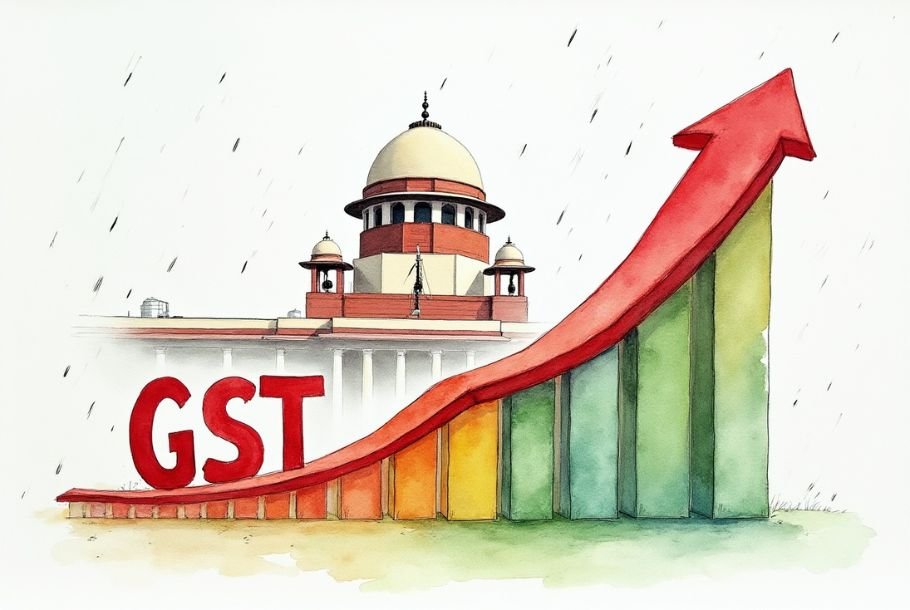
GST, when it was implemented on 1 July 2017, was envisaged as a significant tax reform which would bring central and state taxes into a unified system and reduce the multifold and cascading effect of indirect taxes. 17 major taxes are subsumed under GST, barring Central Excise Duty, Service Tax and VAT, under the motto “one nation-one tax” of India’s indirect tax framework.
While the GST Council has worked overtime and clarified many aspects with circulars and notifications been issued from time to time. In the last 8 years, GST also evolved via rate rationalization and process digitalization, but teething problems continued and proved to be a dampener for GST. Certain issues still remained resolved post its implementation in 2017 and new ones also started to crop up like inverted duty structure that created refund complications for businesses, classification disputes that led to unnecessary litigation, complex compliance requirements, etc. that burdened taxpayers. Therefore, the Government’s started to put in hard focus on addressing systemic issues that have plagued businesses and consumers. In fact, the Hon’ble Finance Minister, Ms. Nirmala Sitaram, has said that immediately after the budget session in February 2025, she started working on the GST issues and rate cut.
On 15th August 2025, Prime Minister Sh. Narendra Modi, addressing the nation had announced – “The government will bring Next-Generation GST reforms, which will bring down tax burden on the common man. It will be a Diwali gift for you.” The reforms, he said, would directly benefit the common man, farmers, MSMEs, women, youth, and middle-class families, while strengthening India’s long-term growth.
Honoring the commitment, recently the GST Reform Bill was unveiled by Finance Minister Nirmala Sitharaman in what she termed a “structural reform for ease of living”. In this, the GST Council approved comprehensive changes to India’s indirect tax system, marking the most significant revision since GST implementation henceforth called as GST 2.0. The intention was to prioritize consumers by lowering rates on essentials and high-value items, empower MSMEs and manufacturers with smoother cash flows, strengthen state revenues, and boost demand driving consumption and manufacturing growth across India. A notable aspect of these reforms was the complete consensus achieved among all states. This unanimity suggests broader recognition of the reforms’ necessity and potential benefits.
For Corporates, GST 2.0 will have a positive impact on procedural aspects like return filing, faster refunds, reduced compliance costs, etc. which will enhance ease of doing business. Easier and lower compliance will be a ‘feel-good’ for corporates, MSMEs and start-ups, but this would also mean more social responsibility on them, though not a new dimension but with the Government doing its part, the expectations from the other side would be reciprocally expected.
Also, reduction in healthcare, education cost, etc. through rationalization of GST rates, will result in corporates promoting healthcare, education and environmental sustainability. This reduced cost is expected to create a bandwidth for corporates to channel more funds into social initiatives as lower costs should help increase the profits. Those genuinely dedicated to the cause will invest this money on social and environmental initiatives including net-zero emissions, if not into CSR spending directly. Businesses will be looking to embrace sustainability and better contribute to India’s economic and environmental goals. Businesses also may re-evaluate their CSR strategies considering tax implications and business benefits.
The other expectation towards corporate responsibility is to pass on the benefits on lower costs to the consumers. The Anti Profiteering clause mandates corporates to pass on any reduction in GST to the recipient by reduction in prices. As the revised come into force w.e.f. 22nd September, 2025, inflation will get a new check-point if corporates strictly adhere to this anti-profiteering clause.
The reforms actually show a definite trend, attention to particular sectors like food, healthcare, daily use items, household goods, MSME products, consumer items are made more affordable for common man after giving them some additional tax benefits through slab rates. Most significantly, health insurance for individual policyholders will be completely exempt from GST. Manufacturing sectors employing large workforces will benefit from reduced input costs, potentially boosting employment and competitiveness. These will positively impact reduction in inflation. On the other hand, luxury remains at 18%, which means give to those who cannot afford properly and tax those who can.
But what’s in it for the Government to show so much generosity? The answer can be simple to say, gain in the long run as the two-slab system i.e. 5% and 18% will make taxation transparent and non-compliance will reduce. Another step taken towards the dream of making India a non-adversarial tax regime. To deliver on the promises and checking inflation. To subtly tell the people that buy online on bill, as taxes are low, instead of paying cash and no asking for tax receipts. MSMEs and households’ delight will create a sustainable image for the Government.
The true test will now be in two phases – Phase one being execution and the resulting impact on inflation, business growth, and overall economic dynamism in the coming quarters. Phase two, would be on the corporates to make this success by fulfilling their corporate social responsibilities.


















